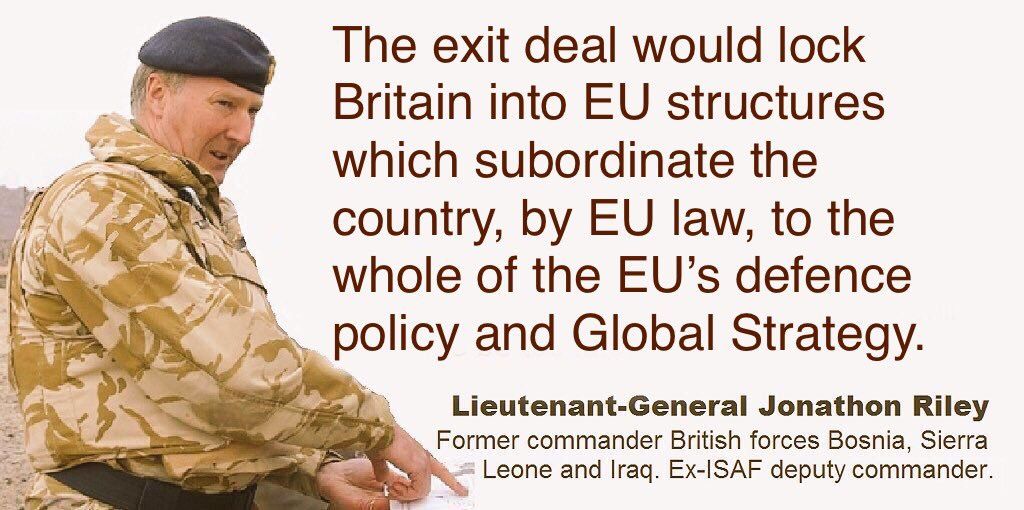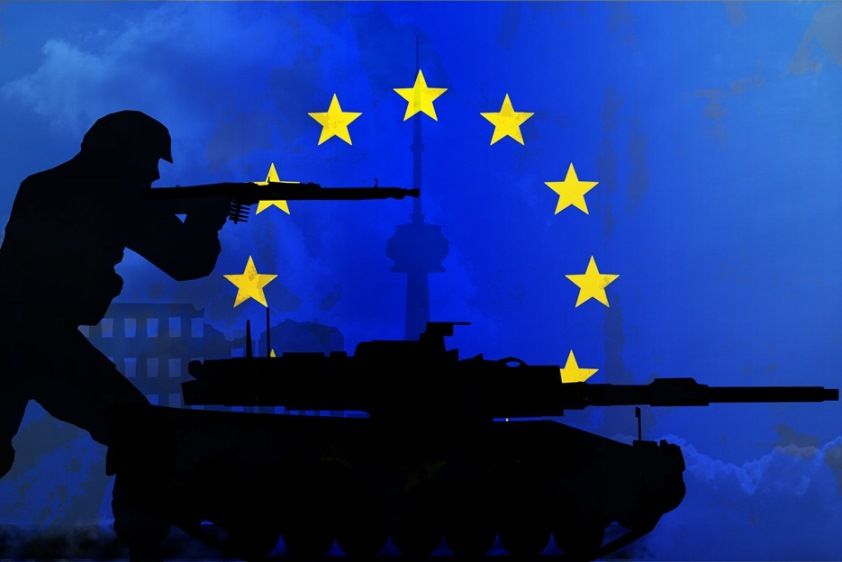What Does EU Defence Cooperation Mean For Brexit Britain?

INSIDE OVER - Matt Snape - 7 October 2019
(Norwegian translation below)
Brexit Party MEP Jake Pugh revealed to the Daily Express that Brussels is attempting to integrate EU member states’ armed forces into a united body independent from NATO. He unveiled a document on Twitter entitled The Future of Warfare in which pro-EU politicians are asking for military integration and strategic autonomy. Tory MP Steve Baker labelled the proposal as ‘astonishing.’ It appears that the EU is creating a defence union by stealth, which may pave the way for an EU Army in the long-term. In between the time Britain voted to leave the EU in June 2016 to the present day, there is a risk that this country has already signed up to Brussels’ plans without realising.
Research compiled by Veterans for Britain has revealed the breathtaking extent to which the UK could already be integrated into a European defence union under a treaty-based framework called Permanent Structured Cooperation (PESCO). It aims to jointly develop defence capabilities and make them available for EU military operations. PESCO is closely connected to the new Coordinated Annual Review on Defence and the European Defence Fund. The EU Defence Agency (EDA) provides an important central role in policy development to add to its research and strategy functions. European defence is awarded with a significant budget.
PESCO concentrates mostly on two types of risk: institutional and strategy. The first one includes standing formations and commitments whilst the second includes policy, training, ethos and legal oversight. Veterans for Britain suggests there is a lack of clarity among civil servants over what the UK will be signing up to after Brexit. For example, regarding PESCO’s strategic areas, British ministers have signed off the European Defence Action Plan, which sets out a €5 billion objective for spending on capability. This paves the way for a Single Market for defence and EU engagement in security of supply.
Furthermore, the Government’s Foreign Policy, Defence and Development Future Partnership Paper discusses Britain’s post-Brexit cooperation with the EU. No UK minister has stated that this country will not participate in this institutional area of PESCO after October 31st. Britain is also planning to lead in another institutional scheme called the EU Battlegroups beyond Brexit, which is a mechanism for small scale deployments usually involving more than one EU member state on an EU mission. There is no point in Britain maintaining its participation in the EU Battlegroups if this nation is unable to have a seat at the table that makes decisions on this area after October 31st. This proves the Government is sleepwalking into PESCO integration.

The Guardian reports that Boris Johnson has told Brussels that he wants to rewrite the defence pledges in the current Withdrawal Agreement. However, this only suggests the Government wants looser cooperation, not that it intends to abandon PESCO completely. Theresa May’s deal fails to address this flaw and prevents Britain from regaining total sovereignty over how its defence assets are used.
Post-Brexit, the UK should depend upon NATO for defence cooperation, but PESCO has the potential to weaken decades of cooperation with the US. Ellen Lord, US Under Secretary of Defence, and Andrea Thompson, Under Secretary of State, wrote a joint letter to Federica Mogherini warning that PESCO would prevent companies based outside the EU from participating in military projects. The Trump administration has threatened various responses that would unlikely be positive for either side, undermining the cooperation and security America and Europe both need when Russia, China and Iran continue to present an increasing threat to both continents.
The Government must proceed with caution when signing up to European defence initiatives. Though their desire to maintain cooperation and security with the EU post-Brexit is based on good faith, politicians are sleepwalking into a trap that could undermine decades of cooperation with the US and NATO in general. After October 31st, this will be one of the many areas of European integration the UK must untangle itself from.
NORWEGIAN TRANSLATION
Brexit-partiets MEP Jake Pugh avslørte overfor Daily Express at Brussel forsøker å integrere EUs medlemsstaters væpnede styrker i et samlet organ uavhengig av NATO. Han avduket et dokument på Twitter med tittelen The Future of Warfare der pro-EU-politikere ber om militær integrasjon og strategisk autonomi. Tory-parlamentsmedlem Steve Baker betegnet forslaget som ‘forbløffende.’ Det ser ut til at EU skaper en forsvarsunion ved stealth, som kan bane vei for en EU-hær på lang sikt. Mellom det tidspunktet Storbritannia stemte for å forlate EU i juni 2016 til i dag, er det en risiko for at dette landet allerede har meldt seg til Brussels planer uten å innse det.
Forskning utarbeidet av Veterans for Britain har avslørt den fantastiske graden som Storbritannia allerede kunne integreres i en europeisk forsvarsunion under en traktatbasert ramme som kalles Permanent Structured Cooperation (PESCO). Målet er å i fellesskap utvikle forsvarsevner og gjøre dem tilgjengelige for EUs militære operasjoner. PESCO har nær tilknytning til den nye koordinerte årlige evalueringen av forsvaret og det europeiske forsvarsfondet. EUs forsvarsbyrå (EDA) gir en viktig sentral rolle i politikkutviklingen for å øke forsknings- og strategifunksjonene. Europeisk forsvar tildeles et betydelig budsjett.
PESCO konsentrerer seg mest om to typer risikoer: institusjonell og strategi. Den første inkluderer stående formasjoner og forpliktelser, mens den andre inkluderer politikk, opplæring, etos og juridisk tilsyn. Veteraner for Storbritannia antyder at det er mangel på klarhet blant embetsmenn om hva Storbritannia vil melde seg til etter Brexit. For eksempel angående PESCOs strategiske områder, har britiske ministre signert den europeiske forsvarshandlingsplanen, som angir et mål på 5 milliarder euro for å bruke kapasitet. Dette baner vei for et indre marked for forsvar og EUs engasjement i forsyningssikkerheten.
Videre diskuterer regjeringens fremtidige partnerskapspapir for utenrikspolitikk, forsvar og utvikling Storbritannias Storbritannias samarbeid etter Brexit-samarbeidet med EU. Ingen britisk statsråd har uttalt at dette landet ikke vil delta i dette institusjonelle området PESCO etter 31. oktober. Storbritannia planlegger også å lede i en annen institusjonell ordning kalt EUs stridsgrupper utover Brexit, som er en mekanisme for småskala utplasseringer som vanligvis involverer mer enn ett EU-medlemsland på et EU-oppdrag. Det er ikke noe poeng i at Storbritannia opprettholder sin deltakelse i EUs slaggrupper hvis denne nasjonen ikke kan få plass til bordet som tar beslutninger på dette området etter 31. oktober. Dette beviser at regjeringen søvnganger i PESCO-integrasjon.
The Guardian melder at Boris Johnson har sagt til Brussel at han ønsker å omskrive forsvarsløfterne i gjeldende uttaksavtale. Dette antyder imidlertid bare at regjeringen ønsker et løsere samarbeid, ikke at den har til hensikt å forlate PESCO fullstendig. Theresa May's avtale unnlater å løse denne feilen og forhindrer Storbritannia i å gjenvinne total suverenitet over hvordan forsvarsverdiene brukes.
Post-Brexit, Storbritannia bør være avhengige av NATO for forsvarssamarbeid, men PESCO har potensial til å svekke flere tiår med samarbeid med USA. Ellen Lord, USAs under forsvarsminister, og Andrea Thompson, utenriksminister, skrev et felles brev til Federica Mogherini med advarsel om at PESCO ville forhindre selskaper basert utenfor EU fra å delta i militære prosjekter. Trump-administrasjonen har truet forskjellige svar som sannsynligvis vil være positive for begge sider, undergrave samarbeidet og sikkerheten Amerika og Europa begge trenger når Russland, Kina og Iran fortsetter å utgjøre en økende trussel mot begge kontinenter.
Regjeringen må fortsette med forsiktighet når hun melder seg til europeiske forsvarsinitiativer. Selv om deres ønske om å opprettholde samarbeid og sikkerhet med EU etter Brexit er basert på god tro, sovner politikerne i en felle som kan undergrave tiår med samarbeid med USA og NATO generelt. Etter 31. oktober vil dette være et av de mange områdene for europeisk integrasjon Storbritannia må løsrive seg fra.
WHO and WHAT is behind it all ? : >
The bottom line is for the people to regain their original, moral principles, which have intentionally been watered out over the past generations by our press, TV, and other media owned by the Illuminati/Bilderberger Group, corrupting our morals by making misbehavior acceptable to our society. Only in this way shall we conquer this oncoming wave of evil.
Commentary:
Administrator
All articles contained in Human-Synthesis are freely available and collected from the Internet. The interpretation of the contents is left to the readers and do not necessarily represent the views of the Administrator. Disclaimer: The contents of this article are of sole responsibility of the author(s). Human-Synthesis will not be responsible for any inaccurate or incorrect statement in this article. Human-Synthesis grants permission to cross-post original Human-Synthesis articles on community internet sites as long as the text & title are not modified.
The source and the author's copyright must be displayed. For publication of Human-Synthesis articles in print or other forms including commercial internet sites. Human-Synthesis contains copyrighted material the use of which has not always been specifically authorized by the copyright owner. We are making such material available to our readers under the provisions of "fair use" in an effort to advance a better understanding of political, economic and social issues. The material on this site is distributed without profit to those who have expressed a prior interest in receiving it for research and educational purposes. If you wish to use copyrighted material for purposes other than "fair use" you must request permission from the copyright owner.